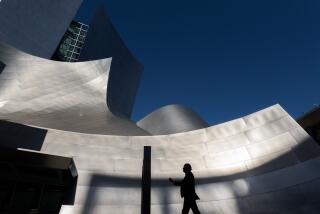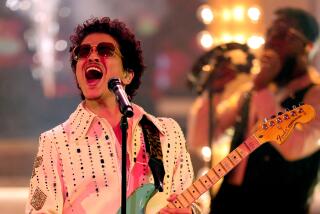Roger Waters brings ‘The Wall’ to the Coliseum with a new focus
When Pink Floyd first took its concept album “The Wall” to the concert stage more than three decades ago, even lead singer and chief songwriter Roger Waters couldn’t imagine a day when rock music might get any bigger.
But 32 years later, his magnum opus about the battle between individual freedoms and authoritarian oppression has magnified beyond Waters’ own expectations of yore. Now the man who once excoriated the voluminous expansion of the rock concert experience has helped institutionalize it.
“I famously hated playing to large numbers of people and playing in stadiums,” Waters, 68, said from a tour stop in Austin, Texas, earlier this month. “The Wall” tour returns Saturday to Los Angeles, where it all began in 1980 at the Los Angeles Memorial Sports Arena. This time, though, the British rocker will be building “The Wall” next door, at the Coliseum, one of nine stadium dates on the North American tour leg.
“The outdoor version, which we developed for South America and which is so much bigger than the arena shows,” he said, “illuminates the piece in ways we can’t and couldn’t do indoors.”
For instance, in the arena version, the metaphorical wall that is gradually built through the course of the evening typically spans about 200 feet when he’s booked into venues like Staples Center, where he brought the show in 2010. At the Coliseum, it will stretch out to around 500 feet.
“It’s a new concept of how to produce rock ‘n’ theater on a great big football field,” Waters said. “We have technology available that’s so profoundly superior to what we had 30 years ago. You can be 200 yards from the show and still be completely engaged with what you’re seeing.” As of Friday, the Coliseum show is “on track to sell out,” a spokesman for concert promoter Live Nation said.
The recent South American tour of “The Wall” broke attendance records there — nine sold-out shows at River Plate Stadium in Buenos Aires trounced the previous record of five at the same venue held by the Rolling Stones — and it’s also been among the top-grossing concert draws in North America since he resurrected and updated the show in 2010. Since bringing “The Wall” back, Waters has done 150 performances that have grossed $218 million in 27 countries.
It would be tempting to think that by now “The Wall” is a well-oiled machine with every element solidly in place down to the last microsecond of music and pixel of imagery.
“I take a hard drive straight home from every gig and then look at it the next day or the next night and I write notes,” he said. “I don’t think there’s been a single day where I haven’t changed something.”
Conceptually, too, the show has grown from its origins as a polemic largely about the angst of one particular rock star.
“The new incarnation of ‘The Wall’ is completely unlike the 1980 version,” he said. “It’s developed into being much more of an international polemic, and it’s also much more moving,” he said, referring to images, many submitted by fans around the world, of family or friends killed in various wars over the last century.
“In those days it was about the internal struggle of me, when I was younger. It’s now much more about everybody else, much less about me, and what’s going on in politics, communication and all the stuff I care so deeply about. In consequence, lots of people in the audience weep. That makes me very happy, to be able to engage people to where they can empathize with others to the point where they weep.”
It doesn’t take much to get Waters’ wrath raging on any of a myriad of subjects that fall under the umbrella of “all the stuff I care so deeply about” — the real estate mortgage crisis in the U.S., the cult of celebrity worship, rampant consumerism.
Much of it he relates back to two classic novels that figure prominently in his list of formative cultural works: George Orwell’s “1984” and Aldous Huxley’s “Brave New World.”
“There’s a big difference between Orwell and Huxley,” he says, paraphrasing a sentiment voiced in Edgar Britt’s book “Post Haste,” which Waters says unapologetically that “I stole for ‘Amused to Death,’” his 1992 solo album.
“Orwell in ‘1984’ said we would come under the control of errant authority. Huxley was more concerned with the idea that this authority would not have to bother to burn books because nobody would read them, that we would live in a pampered and soporific state in which we were so pleasured by nonsense that none of us would dream of turning around and reading a book.
“Look around — we’ve got the Kardashians or ‘American Idol’ or whatever it is, all that reality nonsense that sucks the living seconds out of our days in increasing amount, in my view. It lulls us into this completely false sense that this is a decent reality within which to frame the fleeting seconds we have on this earth.”
Ultimately, that’s the wall that Waters yearns to bring down with his ideas and his music, a campaign of engagement that often leaves him feeling another emotion he didn’t have much contact with three or four decades ago.
“As I sometimes say to the audience now, I’m so moved playing in these big places, being with a great band and seeing the audience’s response,” he said. “They get so emotional, and I’m so moved — I have to admit that 30 years ago I was famously hiding behind my own walls. I didn’t like being in big spaces with lots and lots of people. But in the intervening 30 years, I’ve changed.
“I’m not that miserable … up guy I was then,” he said. “I could not be happier than I am now to be in that room, that space with those people, joining together in communion while we’re performing ‘The Wall.’ It makes me inordinately happy. I’ve turned into a happy old codger.”
More to Read
The biggest entertainment stories
Get our big stories about Hollywood, film, television, music, arts, culture and more right in your inbox as soon as they publish.
You may occasionally receive promotional content from the Los Angeles Times.






